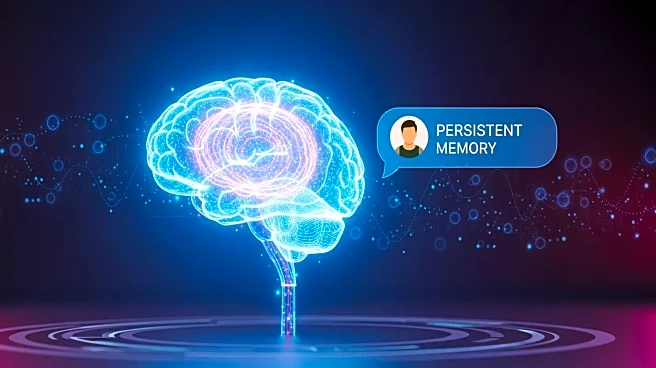What's Happening?
Developers are advancing the capabilities of chatbots by integrating persistent memory and personalization features. This development involves creating intelligent agents that can remember, learn, and adapt to user interactions over time. The system utilizes
a memory store with an exponential decay mechanism to manage information retention, allowing the chatbot to evolve from a static script into a dynamic digital companion. The memory system is designed to store user preferences and topics, enabling the chatbot to provide context-aware responses. This approach aims to improve the chatbot's performance by tailoring interactions based on past user inputs and preferences.
Why It's Important?
The integration of persistent memory and personalization in chatbots represents a significant leap in artificial intelligence technology. This advancement has the potential to transform customer service and user interaction across various industries by providing more personalized and efficient responses. Businesses could benefit from increased customer satisfaction and retention as chatbots become more adept at understanding and anticipating user needs. However, there are concerns about the ethical implications of such technology, particularly regarding privacy and data security. The ability of chatbots to remember and adapt to user interactions raises questions about how personal data is stored and used.
What's Next?
As these advanced chatbots continue to develop, businesses and developers will need to address the ethical and privacy concerns associated with persistent memory systems. Regulatory frameworks may need to be established to ensure that user data is handled responsibly. Additionally, further research and development will likely focus on enhancing the accuracy and reliability of these systems, as well as exploring new applications in different sectors. Stakeholders, including businesses, policymakers, and consumer advocacy groups, will play a crucial role in shaping the future of this technology.
Beyond the Headlines
The evolution of chatbots into personalized digital companions could lead to broader societal changes. As these systems become more integrated into daily life, they may influence how individuals interact with technology and each other. The potential for chatbots to provide companionship and support in various contexts, such as mental health and education, could have profound cultural and social implications. However, the reliance on AI for personal interactions also raises questions about the impact on human relationships and the potential for technology to replace human roles in certain areas.
















